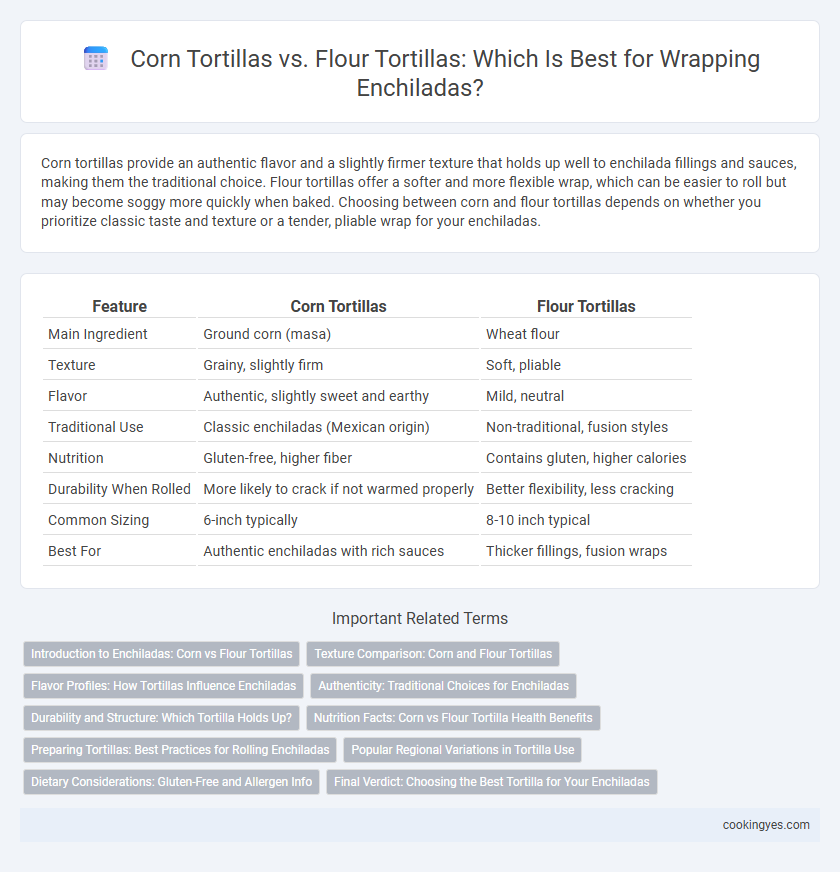Corn tortillas provide an authentic flavor and a slightly firmer texture that holds up well to enchilada fillings and sauces, making them the traditional choice. Flour tortillas offer a softer and more flexible wrap, which can be easier to roll but may become soggy more quickly when baked. Choosing between corn and flour tortillas depends on whether you prioritize classic taste and texture or a tender, pliable wrap for your enchiladas.
Table of Comparison
| Feature | Corn Tortillas | Flour Tortillas |
|---|---|---|
| Main Ingredient | Ground corn (masa) | Wheat flour |
| Texture | Grainy, slightly firm | Soft, pliable |
| Flavor | Authentic, slightly sweet and earthy | Mild, neutral |
| Traditional Use | Classic enchiladas (Mexican origin) | Non-traditional, fusion styles |
| Nutrition | Gluten-free, higher fiber | Contains gluten, higher calories |
| Durability When Rolled | More likely to crack if not warmed properly | Better flexibility, less cracking |
| Common Sizing | 6-inch typically | 8-10 inch typical |
| Best For | Authentic enchiladas with rich sauces | Thicker fillings, fusion wraps |
Introduction to Enchiladas: Corn vs Flour Tortillas
Corn tortillas, traditionally made from nixtamalized corn, offer an authentic flavor and a slightly thicker texture ideal for absorbing rich enchilada sauces without becoming soggy. Flour tortillas, made from wheat flour, provide a softer, more pliable wrap that holds fillings well but can lack the distinctive corn taste essential to classic enchiladas. Choosing between corn and flour tortillas depends on regional preferences and desired texture, with corn tortillas being favored in traditional Mexican cuisine for their robust flavor and compatibility with spicy enchilada sauces.
Texture Comparison: Corn and Flour Tortillas
Corn tortillas offer a firmer, slightly grainy texture that crisps well when baked, providing a traditional and authentic enchilada experience. Flour tortillas, in contrast, are softer and more pliable, resulting in a chewier wrap that retains moisture but may become soggy when baked. The choice between corn and flour tortillas directly impacts the enchilada's overall texture, balancing crispness with tenderness depending on personal preference.
Flavor Profiles: How Tortillas Influence Enchiladas
Corn tortillas deliver a distinctive earthy flavor and a slightly chewy texture that enhances traditional enchiladas by complementing rich, spicy fillings. Flour tortillas offer a milder, buttery taste with a soft, pliable consistency that creates a more neutral base, allowing bold enchilada sauces and cheeses to stand out. The choice between corn and flour tortillas significantly affects the overall flavor profile and authenticity of the enchilada experience.
Authenticity: Traditional Choices for Enchiladas
Traditional enchiladas are authentically made with corn tortillas, which provide a distinct texture and flavor essential to Mexican cuisine. Corn tortillas hold up well when dipped in sauce, maintaining structural integrity without becoming overly soft or mushy. Flour tortillas, while softer and more pliable, lack the characteristic taste and cultural authenticity that define classic enchiladas.
Durability and Structure: Which Tortilla Holds Up?
Corn tortillas offer superior durability and structure for enchiladas due to their firmness and natural flexibility after steaming, which prevents tearing and enhances the wrapping process. Flour tortillas, while softer and more pliable, tend to soak up sauce quickly, leading to sogginess and reduced structural integrity during cooking. Choosing corn tortillas ensures the enchilada maintains its shape and texture, delivering a more authentic and satisfying bite.
Nutrition Facts: Corn vs Flour Tortilla Health Benefits
Corn tortillas contain fewer calories and less fat than flour tortillas, making them a healthier choice for enchilada wrapping. They are rich in fiber, magnesium, and antioxidants such as lutein and zeaxanthin, which promote eye health and digestion. In contrast, flour tortillas typically have higher amounts of sodium and carbohydrates while offering less fiber and fewer micronutrients.
Preparing Tortillas: Best Practices for Rolling Enchiladas
Corn tortillas are preferred for authentic enchiladas due to their firm texture and ability to absorb sauces without becoming soggy. To prepare corn tortillas for rolling, lightly warm them on a skillet or wrap in a damp towel to increase pliability, reducing the risk of cracking. Flour tortillas offer more flexibility but tend to create a softer, less traditional enchilada, making corn the optimal choice for maintaining structure during rolling and baking.
Popular Regional Variations in Tortilla Use
Corn tortillas dominate traditional enchilada recipes in regions such as Mexico City and Oaxaca, prized for their authentic texture and ability to absorb rich sauces. Flour tortillas are preferred in northern Mexico and parts of the United States, offering a softer, chewier alternative that complements heavier fillings. This regional variation reflects local ingredient availability and cultural preferences, influencing the overall flavor and consistency of the enchilada dish.
Dietary Considerations: Gluten-Free and Allergen Info
Corn tortillas are the preferred choice for enchiladas due to their naturally gluten-free nature, making them suitable for individuals with celiac disease or gluten intolerance. Flour tortillas contain wheat, which poses a risk for gluten-related allergies and sensitivities. For allergen-conscious meals, corn tortillas offer a safer option, as they typically do not contain common allergens found in wheat-based products.
Final Verdict: Choosing the Best Tortilla for Your Enchiladas
Corn tortillas offer authentic flavor and superior texture, enhancing the traditional enchilada experience with their slightly earthy taste and better hold of sauces. Flour tortillas provide a softer and more pliable option, suitable for those preferring a milder taste and a less crumbly wrap. For the best enchiladas, corn tortillas remain the top choice, balancing authenticity and structural integrity, especially when properly warmed to prevent cracking.
Corn tortillas vs flour tortillas for enchilada wrapping Infographic

 cookingyes.com
cookingyes.com